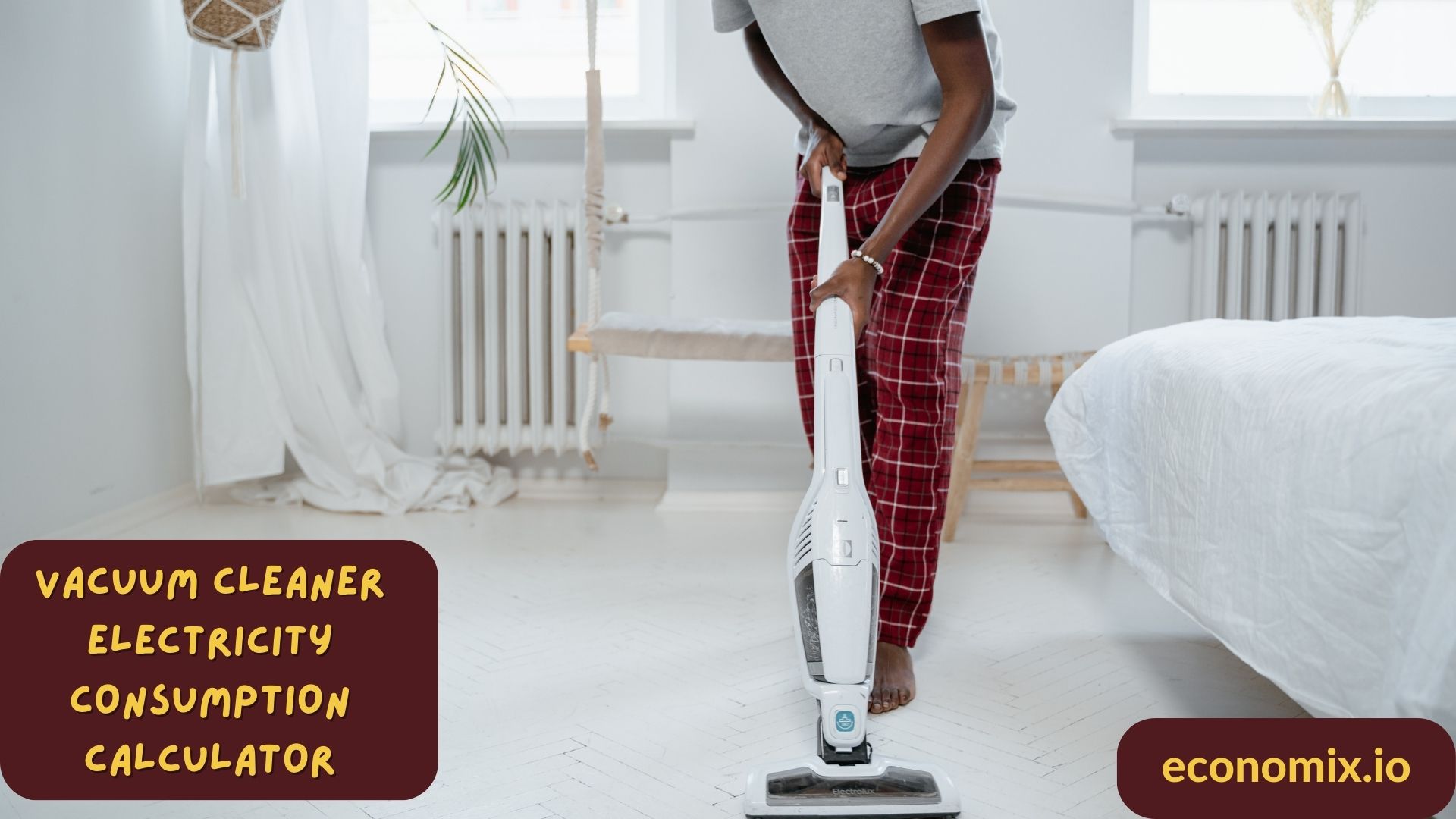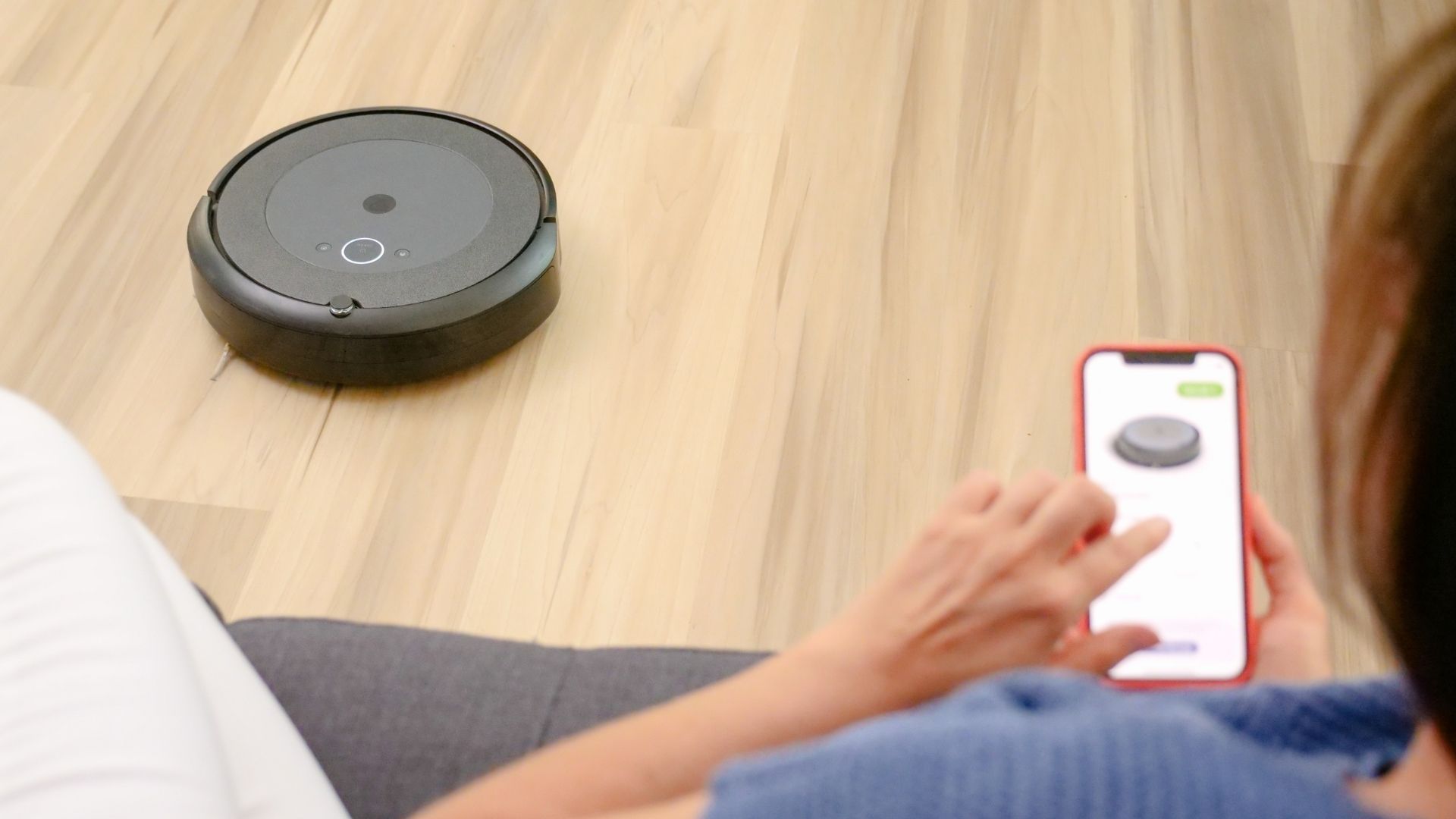Table of Contents
- How Much Does Vacuuming Really Cost You?
- How Much Electricity Does a Vacuum Cleaner Use?
- Do Vacuum Cleaners Use a Lot of Power?
- How to Calculate Vacuum Energy Consumption?
- Is 800 Watts a Lot of Power for a Vacuum Cleaner?
- How Much Does It Cost to Run a Vacuum Cleaner?
- What Uses the Most Electricity in a Home?
- How to Reduce the Cost of Vacuuming?
- Take Control of Your Vacuum’s Energy Use
Estimated reading time: 6 minutes. Last updated: December 28, 2024.
How Much Does Vacuuming Really Cost You?
Vacuuming is a regular household chore, but have you ever wondered how much electricity your vacuum cleaner uses? The Vacuum Cleaner Electricity Consumption Calculator allows you to quickly estimate the energy consumption and cost of running your vacuum cleaner. This tool provides an easy way to analyse your energy consumption, helping you to manage costs and make smarter decisions for your home.

Knowing how much power your vacuum cleaner uses can help you take control of your energy costs and contribute to a greener lifestyle.
How Much Electricity Does a Vacuum Cleaner Use?
Vacuum cleaners typically range in power from 800W to 1600W, depending on the model and suction strength. Here’s an example to illustrate energy usage:
- If you run a 1200W vacuum cleaner for 1 hour, the energy consumed is: Energy (kWh) = (1200 × 1) ÷ 1000 = 1.2 kWh
- At an electricity rate of $0.15 per kWh, the cost of running the vacuum for an hour is: Cost = 1.2 × $0.15 = $0.18 per hour
Now, imagine vacuuming for 1 hour weekly. Over a month (4 weeks), the total cost is around $0.72. While this might seem minimal, the numbers can add up when paired with other appliances.
Do Vacuum Cleaners Use a Lot of Power?
While vacuum cleaners don’t consume as much electricity as ovens or air conditioners, they can still impact your energy bill, especially if used frequently. For example:
-
An 800W vacuum cleaner running for
30 minutes uses:
Energy = (800 × 0.5) ÷ 1000 = 0.4 kWh
Cost: 0.4 × $0.15 = $0.06 per session - A higher-powered 1600W vacuum cleaner running for the same time consumes twice as much energy, costing $0.12 per session.
If you vacuum multiple times a week, switching to a lower-wattage or energy-efficient model can make a noticeable difference.
How to Calculate Vacuum Energy Consumption?
Formula to Calculate Vacuum Cleaner Electricity Consumption:
Energy (kWh) = Power Rating (Watts) × Usage Time (Hours) ÷ 1000
Example: A 1000W vacuum cleaner used for 1.5 hours consumes:
Energy = (1000 × 1.5) ÷ 1000 = 1.5 kWh
If your electricity rate is $0.15 per kWh, the cost is:
Cost = 1.5 × $0.15 = $0.23
By using the Vacuum Cleaner Electricity Consumption Calculator, you can avoid manual calculations and instantly find out the energy usage and cost based on your specific vacuum cleaner and usage habits.
Is 800 Watts a Lot of Power for a Vacuum Cleaner?
An 800W vacuum cleaner is considered energy-efficient and suitable for most household cleaning tasks. While it consumes less power compared to higher-wattage models, modern designs ensure effective suction without compromising performance.
Higher-wattage vacuums (e.g., 1500W or 1600W) offer more powerful suction, but the increased energy consumption may not always justify the additional cost. If you’re looking for a balance between performance and energy efficiency, an 800W to 1200W vacuum is often the sweet spot.
How Much Does It Cost to Run a Vacuum Cleaner?
Here’s a breakdown of costs based on different power ratings:
-
800W Vacuum Cleaner:
30 minutes/day: (0.8 × 0.5 ÷ 1000) = 0.4 kWh/day = $0.06/day
Monthly cost (30 days): $1.80 -
1200W Vacuum Cleaner:
30 minutes/day: (1.2 × 0.5 ÷ 1000) = 0.6 kWh/day = $0.09/day
Monthly cost (30 days): $2.70 -
1600W Vacuum Cleaner:
30 minutes/day: (1.6 × 0.5 ÷ 1000) = 0.8 kWh/day = $0.12/day
Monthly cost (30 days): $3.60
By comparing these numbers, you can see how choosing the right vacuum cleaner and limiting usage can save money over time.

What Uses the Most Electricity in a Home?
Vacuum cleaners, while not the largest energy consumers, are part of a broader picture of household energy use. Appliances that consume the most electricity include:
- Heating and cooling systems (air conditioners, heaters).
- Water heaters.
- Ovens and stoves.
- Washing machines and dryers.
To fully optimize your energy usage, consider using tools like the Washing Machine Electricity Consumption Calculator or the Oven Electricity Consumption Calculator . These calculators can help identify other energy-intensive appliances in your home and ways to manage them efficiently.
How to Reduce the Cost of Vacuuming?
Reducing the cost of vacuuming doesn’t require significant effort—simple changes can make a big difference.
- Use Energy-Efficient Models: Look for vacuums with high efficiency and lower wattage.
- Vacuum Less Frequently: Unless necessary, try reducing the number of vacuuming sessions per week.
- Clean Filters Regularly: Dirty filters reduce suction power, causing the vacuum to work harder and use more energy.
- Vacuum Strategically: Focus on high-traffic areas rather than vacuuming the entire home every time.
By applying these tips, you can lower energy usage without compromising cleanliness.
Take Control of Your Vacuum’s Energy Use
The Vacuum Cleaner Electricity Consumption Calculator is a must-have tool for anyone looking to save money and manage energy usage effectively. From calculating the cost of running a vacuum cleaner for an hour to comparing power consumption across different models, this tool gives you the clarity you need to make better decisions.
Small steps, such as choosing an energy-efficient vacuum or vacuuming strategically, can lead to significant savings over time. To take your energy optimization to the next level, pair this tool with others like the Coffee Maker Electricity Consumption Calculator or the Clothes Dryer Electricity Consumption Calculator .
Start using the calculator today to take control of your energy expenses—because every kilowatt-hour saved is a step toward a cleaner home and a greener planet!
- U.S. Department of Energy - Estimating Appliance and Home Electronic Energy Use https://www.energy.gov/energysaver/estimating-appliance-and-home-electronic-energy-use
- Energy Star - Low- to No-Cost Tips for Saving Energy at Home https://www.energystar.gov/products/recent_program_updates/low-no-cost-tips
- Federal Trade Commission (FTC) - Appliances https://www.ftc.gov/industry/appliances